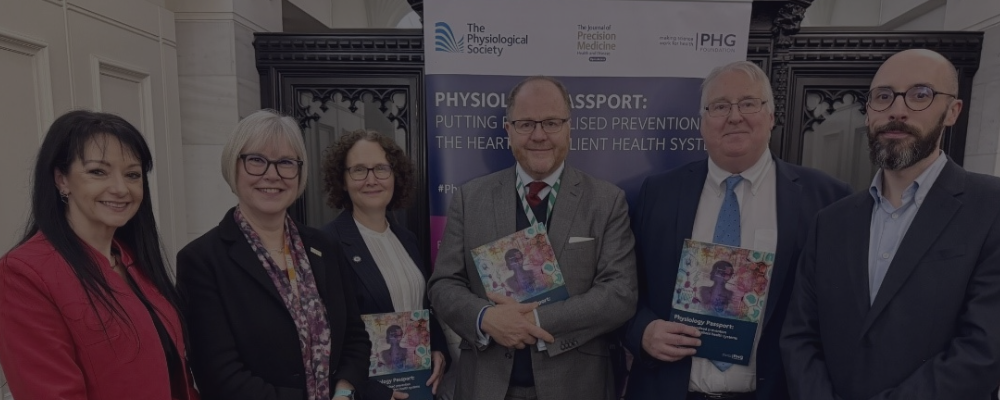
Shaping the future of personalised healthcare
Alanna Orpen, Senior Media and Communications Officer, The Physiological Society
Physiology News is your magazine, here to showcase your voices. We want you, our members, to be involved in shaping and contributing to this magazine. Maybe you’d like to share how you won your first grant? Wish to showcase your facility or department? Tell us about your typical day working in your discipline/field, or possibly overcoming epic fails in the lab? Please do share any suggestions or your story ideas with the Physiology News Advisory Group at comms@physoc.org.

Welcome to our Precision Medicine special issue! This Spring Issue is dedicated to The Society’s latest policy and journal activities to shape the future of personalised health and disease treatment.
We are at a pivotal moment for redefining how we understand, diagnose, and treat disease. The thoughts and vision of Professor Colleen Clancy, founding Editor-in-Chief of The Journal of Precision Medicine: Health and Disease as outlined in her Voice of the Editor column. “Together, we can accelerate the translation of discovery into impactful solutions that shape the future of healthcare,” shares Colleen on pushing the boundaries of precision medicine.
The urgency for a personalised and integrated physiology-led approach is discussed in Policy Focus about the precision medicine-based tool named the ‘Physiology Passport’. In the article by Shania Pande, Dr Laura Blackburn, and Professor Dame Melanie Welham, learn more about the policy report launched in Parliament calling for a preventative health approach to be at the heart of healthcare to build a more resilient NHS.
The policy report featured a case study on Social Prescribing, where Nottingham Trent University have launched a successful health and well-being academy at the university. We invited Professor Angus Hunter to write a feature about the Social Prescribing approach and how it can tackle local health inequalities.
Speaking of success stories, we celebrate the winners of the Physiological Reports Early Career Researchers Short Review competition in two of our feature articles. We interviewed Kevin John (University of Canberra, Australia) and Josh Thorley (University of Nottingham, UK), we hope you enjoy reading about their careers and research. We cover football, hot pants, puzzle solving and unlocking codes, and how these can lead to new and more advanced therapeutics.
Learn more about memory formation and muscle decline with the captivating articles by our 2024 R Jean Banister Prize Lecture recipients, Dr Andrew Lin and Dr Colleen Deane. The award spotlights continue with our Q&As with the 2024 Rob Clarke Awards Winners, Ryan Bloxsom (University of Oxford, UK) and Ayesha Pointer (The Francis Crick Institute, UK). If you’re considering applying for our Paton Historical Studies Fund, we recommend reading awardee Dr Matthew Hardy’s (University of Bradford, UK) wonderful account of his project exploring the history of writing in physiology.
To catch-up with the latest news from our growing family of journals, Professor Craig Sale, founding Editor-in-Chief of The Journal of Nutritional Physiology, tells us more about the focus and scope of the journal, “Through our expertise and vision, we hope that the journal will become a critical resource for researchers, clinicians, and policymakers”. Elevating women’s health research is the focus of the column by Professor Jo Adams, Editor-in-Chief of Physiological Reports. Find out more about the editorial series and article types providing broad relevance and translational impact for physiology with Professor Damian Bailey, Editor-in-Chief of Experimental Physiology. Professor Kim Barrett, Editor-in-Chief of The Journal of Physiology, covers the state of research funding in the US and reflects on the implications for the global research community.
This issue honours the lost lives of our members. The gifted Professor Roger Thomas, electrophysiologist and past editor of Physiology News, is fondly remembered in the obit by Christof Schwiening (University of Cambridge, UK). The mentees of Professor Soga Sofola, Professor David Oyebola, Professor Tony Ebeigbe, Professor Vincent Iyawe and Professor Chikodi Anigbogu, have written tributes to these prominent physiologists in a five piece In Memoriam organised by Professor Victor Owoyele (University of Namibia).
Events calendar
There are lots of opportunities to meet up with your communities and explore the latest research insights with our two-day scientific meetings. Find out more from the scientific programme meeting organisers with the meeting previews for Thermal Physiology, Physiology of Obesity, The Role of Insulin, and Cross-Talk of Cells in the Heart 2025.
Your stories
Physiology News is your magazine, here to showcase your voices. We want you, our members, to be involved in shaping and contributing to this magazine. Maybe you’d like to share how you won your first grant? Wish to showcase your facility or department? Tell us about your typical day working in your discipline/field, or possibly share what you learnt from overcoming an epic fail in the lab? Please do share any suggestions or your story ideas with the Physiology News Advisory Group at comms@physoc.org.
Follow us
We are active on LinkedIn, Twitter, Facebook, and now you can also find us on BlueSky! Follow us @physoc.bsky.social to keep posted on our news, events, policy activities and journal research.
Enjoy the issue!



